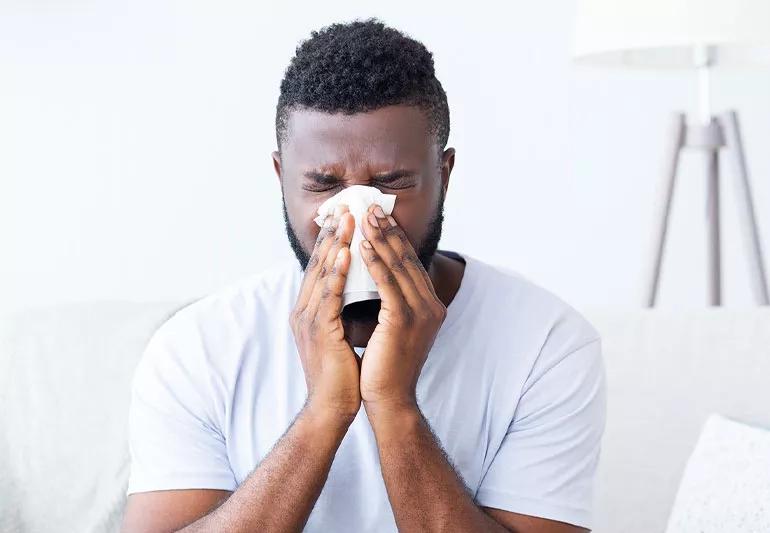They serve a purpose, but too much is uncomfortable

Image content: This image is available to view online.
View image online (https://assets.clevelandclinic.org/transform/83f9e60f-ef24-4c3f-8d3a-20e6d24adf89/manKleenexMucus-1202952876-770x553-1_jpg)
Man blowing nose mucus
Excessive mucus and phlegm may not be much of a conversation starter (unless you’re 14 and trying to spit the farthest). But if you have too much mucus, it can drive you crazy in search of solutions.
Advertisement
Cleveland Clinic is a non-profit academic medical center. Advertising on our site helps support our mission. We do not endorse non-Cleveland Clinic products or services. Policy
First, consider that mucus has a purpose. This fluid is naturally made by your body every day, says laryngologist Paul C. Bryson, MD.
“While the exact amount your body makes isn’t known, most experts think it’s about one liter a day,” he says. (That’s half of a 2-liter bottle of soda!)
Dr. Bryson outlines some ways to get rid of your excess mucus and phlegm.
Mucus has an important role in your body. It’s made by cells in your mouth, throat, nose and sinuses. Its slippery consistency helps protect and moisturize, and traps potential irritants.
Phlegm is made of mucus membranes, but it’s produced and used by your respiratory system to combat inflammation.
Your body can go into overdrive creating mucus when you:
“Environmental allergies can cause excess mucus or phlegm, as can food allergies, but the latter is harder to diagnose based on this symptom alone,” Dr. Bryson explains.
If you’re healthy, your mucus tends to be thin — and you may not even notice it. But if you’re sick, your mucus can become thick and crusty.
And you may not notice phlegm until you cough it up, which can be a symptom of pneumonia or bronchitis.
Advertisement
You may be concerned about the color of your mucus and phlegm, too, whether it’s yellow or green. But the color doesn’t necessarily mean you have an infection.
If you have chronic problems with mucus and phlegm, try the following. These remedies also help if your problem with mucus and phlegm progresses to a post-nasal drip.
Drink more water. Also, consider your medications or any dehydrating beverages you regularly drink like coffee, alcohol and some teas.
“A good rule of thumb is to drink enough water to make your urine pale,” Dr. Bryson advises.
This can help your body moisturize your throat and nasal passages and may help you reduce mucus and phlegm production.
Opt for a cool-mist humidifier and make sure you clean it regularly per its directions.
Make sure the filters are clean and functioning well to keep dust and other potential irritants out of the air.
This helps rinse and hydrate tissues in your nose and sinuses. Use a sterile spray that has sodium chloride.
Using salt water (1 teaspoon of salt per glass of warm water) can ease your irritated throat by clearing away mucus.
Whether it’s a eucalyptus balm or essential oil in a diffuser, the scent of eucalyptus can help loosen mucus in your chest.
Decongestants (in oral form or as a nasal spray) can help reduce the swelling in your nose. There are also expectorants like guaifenesin (like Mucinex®) that help thin mucus.
“If you’re concerned about allergies, remember that the testing is easy and straightforward,” says Dr. Bryson. “You can also try over-the-counter allergy medications, which may solve your issue.”
If you’re in doubt, don’t hesitate to discuss your problem with your primary care doctor or an otolaryngologist, who can dig into your particular symptoms and history to find solutions.
If the amount of mucus your body makes is uncomfortable, you might worry it’s a sign of a more serious problem.
According to Dr. Bryson, mucus isn’t typically a symptom to worry about if it’s your only symptom.
“Worrisome signs are mucus accompanied by fevers, chills and night sweats, especially if you also experience weight loss, nasal obstruction or intermittent nose bleeds for more than two weeks,” he says.
Advertisement

Sign up for our Health Essentials emails for expert guidance on nutrition, fitness, sleep, skin care and more.
Learn more about our editorial process.
Advertisement
Here's when to worry about your nasal mucus changing hues
Sneezing, coughing and clear mucus shouldn’t be ignored
For centuries, people have been drinking mullein tea for respiratory conditions
Not all rainbows have gold at the end — the ones our bodies produce offer insight into our health
Mucus removal tips from a pediatrician
Most recommended precautions center around minimizing bruising or swelling
Even one drink can have an impact on your cognitive function leading to slurred speech, blurred vision and impaired memory
Type 2 diabetes isn’t inevitable with these dietary changes
Applying a hot or cold compress can help with pain
Pump up your iron intake with foods like tuna, tofu and turkey